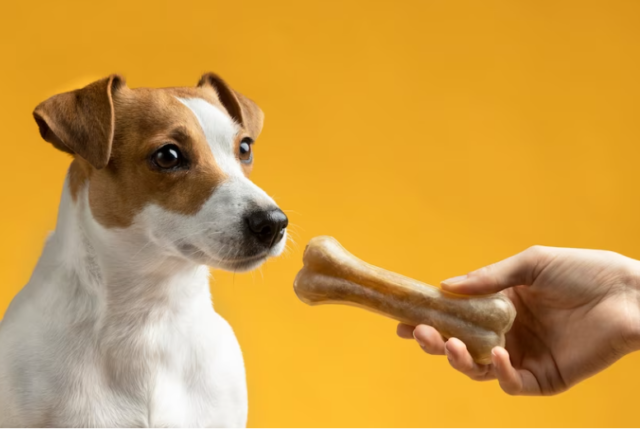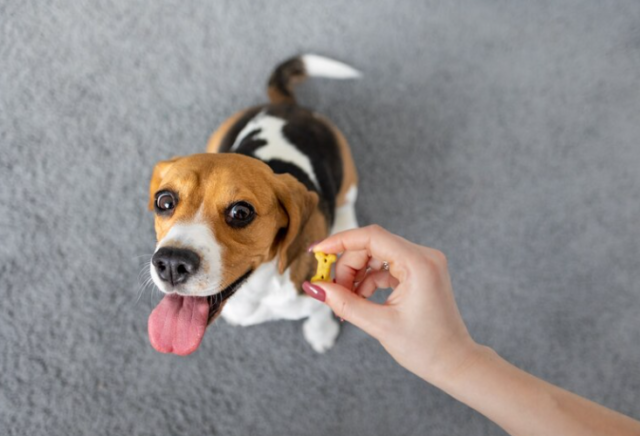Introduction
Has your beloved furry friend developed a peculiar habit of chewing his paws? If so, you may find yourself wondering about the reasons behind this behavior. In this article, we’ll delve into the possible causes of why your dog is chewing his paws and provide you with valuable insights and solutions to address this issue. Understanding the underlying factors can help you ensure your dog’s well-being and provide the necessary care and attention they need.
Common Reasons for Dogs Chewing Their Paws
Allergies and Skin Irritations
Allergies are a common cause of paw chewing in dogs. Just like humans, dogs can be allergic to certain substances, such as pollen, dust mites, or certain foods. Allergic reactions often lead to itchy and irritated skin, prompting your dog to chew his paws for relief. Additionally, environmental factors, such as harsh chemicals or allergens on the ground, can also contribute to paw irritation.
Parasites and Infections
Parasites like fleas, ticks, or mites can infest your dog’s paws, causing discomfort and prompting excessive chewing. Furthermore, bacterial or yeast infections may develop, leading to itchiness and redness. Regular grooming, thorough inspections, and preventative treatments can help keep parasites at bay.
Anxiety and Stress
Dogs, just like humans, can experience anxiety and stress. Separation anxiety, changes in the household, or traumatic events may trigger your dog to chew his paws as a coping mechanism. Identifying the root cause of anxiety and providing a safe and nurturing environment can help alleviate this behavior.
Boredom and Excess Energy
Dogs need mental and physical stimulation to remain content and balanced. If they lack proper exercise, playtime, or engaging activities, they may resort to paw chewing out of boredom. Ensuring regular exercise, interactive toys, and stimulating games can help redirect their energy and prevent this behavior.
Medical Conditions and Pain
Underlying medical conditions, such as arthritis, joint problems, or injuries, can cause discomfort and lead to paw chewing. It’s crucial to consult with your veterinarian to rule out any potential health issues and determine appropriate treatment options.
Solutions to Address Paw Chewing

Consult Your Veterinarian
If your dog’s paw chewing persists or worsens, it’s important to consult with a veterinarian. They can conduct a thorough examination, perform necessary tests, and provide expert guidance tailored to your dog’s specific needs.
Allergy Management
If allergies are the root cause, your veterinarian may recommend allergy testing to identify the specific triggers. Depending on the results, they may prescribe antihistamines, and immunotherapy, or suggest dietary changes to manage your dog’s allergies effectively.
Parasite Prevention and Treatment
To prevent and manage parasites, maintain a regular grooming routine and use appropriate preventative treatments as recommended by your veterinarian. Regularly inspect your dog’s paws for any signs of infestation or infection and seek prompt treatment if needed.
Addressing Anxiety and Stress
If anxiety or stress is the cause, implementing behavior modification techniques, creating a safe and comforting environment, or seeking the guidance of a professional dog trainer or behaviorist can help your dog overcome their anxiety and reduce paw chewing.
Provide Mental and Physical Stimulation
Ensuring your dog receives adequate mental and physical stimulation is crucial. Engage them in interactive play, provide puzzle toys, and consider obedience training to keep their mind active and redirect their energy away from paw chewing.
Conclusion
Understanding why your dog is chewing his paws is the first step toward finding a solution. By addressing the underlying causes and providing the necessary care, attention, and professional guidance, you can help your furry companion overcome this behavior and ensure their overall well-being. Remember, each dog is unique, and finding the right approach may require some trial and error. With patience and love, you can help your dog lead a happy, paw-chewing-free life.
FAQs
Q1: Can food allergies cause my dog to chew his paws?
Yes, food allergies can be a common cause of paw chewing in dogs. Certain ingredients in their diet may trigger an allergic reaction, leading to itching and paw irritation.
Q2: How can I prevent parasites from causing paw chewing?
Regular grooming, including thorough inspections for fleas, ticks, and mites, is essential. Consult with your veterinarian for appropriate preventative treatments and follow their recommendations.
Q3: Are there any home remedies I can try to alleviate my dog's paw chewing?
While home remedies may provide temporary relief, it's important to consult with a veterinarian to identify the underlying cause and develop an effective treatment plan.
Q4: Is it normal for puppies to chew their paws?
Puppies explore the world through their mouths, and some chewing behavior is considered normal. However, excessive or persistent paw chewing should be monitored and addressed if necessary.
Q5: How long will it take for my dog to stop chewing his paws?
The duration may vary depending on the underlying cause and the effectiveness of the chosen treatment. With consistency and patience, you can help your dog break the habit and find relief.
Read also
- Stop Your Dog’s Tail Chewing Habits with These Effective Strategies
- Understanding the Phrase “My Dogs Are Barking” and Its Meaning
- Tough Dog Toys: Durable Toys for Your Pup | Buy Today
- Tuffy Dog Toys – Durable, Fun & Safe for Your Pooch
- Best Dog Food for Golden Retrievers: A Complete Guide
- Do Dog Dental Chews Work? We Investigate and Reveal the Truth
- Discover the Fascinating Characteristics of the Walter Dog Breed
- Discover the Fascinating History of the Oldest Dog Breed
- Best Dog Food for Puppies: Meeting the Nutritional Needs of Large Breeds
- Top 10 Dog Toys for Aggressive Chewers | Keep Your Dog Busy
- Hunting Dog First Aid Kit: Essential Supplies for Your Canine Companion
- 7 Secrets About Chihuahua Husky Mixes That Will Amaze You!
- Stop Dog Nail Bleeding Fast: 5 Easy Home Remedies
- Best Dog Food for French Bulldogs: Secrets Revealed
- Best Dog Food for Seniors
- How to Stop a Dog from Jumping Up on Guests
- Swim with Confidence: Discover the Best Dog Life Jackets Today!
- Discover the Benefits of High Protein Dog Food for Optimal Canine Health
- Discover the Magnificent Heaviest Dog Breeds for Your Home
- Unraveling Shiba Inu Mixes: Discover Canine Crossbreeds





